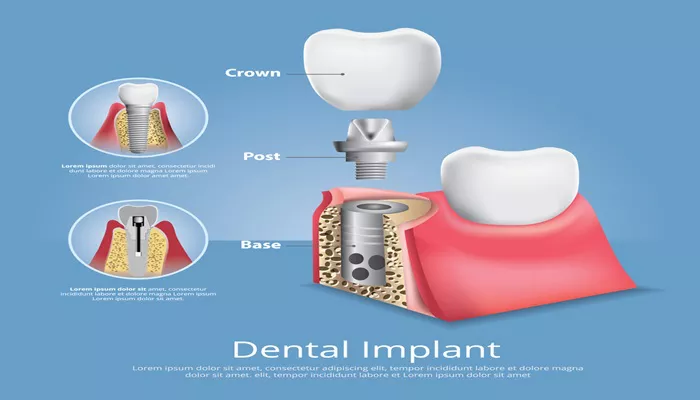Dental implants have become a highly effective and popular solution for replacing missing teeth. They offer a durable, functional, and aesthetically pleasing restoration that can significantly enhance a person’s oral health and overall quality of life. However, maintaining dental implants requires a commitment to proper oral hygiene practices. This article aims to provide a comprehensive and science-based guide on how to clean dental implants at home, addressing the importance of cleaning, the steps involved in the cleaning process, and tips for maintaining optimal oral health.
The Importance of Cleaning Dental Implants
Dental implants, like natural teeth, are susceptible to plaque buildup and the development of gum disease. Plaque is a sticky film of bacteria that forms on the teeth and implants, and if not removed regularly, it can harden into tartar, which is more difficult to remove. Left untreated, plaque and tartar can lead to gum inflammation, infection, and bone loss around the implants, potentially compromising their stability and longevity. Therefore, regular and thorough cleaning of dental implants is crucial for maintaining optimal oral health and ensuring the long-term success of the implants.
Steps for Cleaning Dental Implants at Home
Cleaning dental implants at home involves a combination of daily brushing, flossing, and rinsing with an antiseptic mouthwash. Here are the steps for an effective at-home cleaning routine:
Brushing: Use a soft-bristled toothbrush designed for dental implants or a toothbrush with an electric motor that oscillates or rotates. Apply a small amount of fluoride toothpaste to the brush and place it at a 45-degree angle to the gum line.
Gently move the brush in a circular motion, covering all surfaces of the implants and the surrounding teeth. Avoid using excessive force, as this can damage the implants or the surrounding tissues. Brush for at least two minutes, focusing on the areas where the implants meet the gums and the spaces between the implants and adjacent teeth.
Flossing: Flossing is essential for removing plaque and food particles from the spaces between the implants and adjacent teeth, as well as under the gum line. Use a special floss designed for dental implants or a water flosser, which can be more effective in reaching tight spaces. Gently insert the floss between the implants and teeth, using a gentle back-and-forth motion to clean the sides of the implants and teeth. Be careful not to snap the floss down hard between the teeth, as this can damage the implants or the surrounding tissues.
Rinsing: After brushing and flossing, rinse your mouth with an antiseptic mouthwash to help reduce plaque and bacteria.
Look for a mouthwash that contains fluoride, which can help strengthen the enamel on any natural teeth you have and protect the implants from decay. Use the mouthwash as directed, typically swishing it around in your mouth for 30 seconds to one minute before spitting it out.
Tips for Maintaining Optimal Oral Health with Dental Implants
In addition to following the steps outlined above, here are some additional tips for maintaining optimal oral health with dental implants:
Regular Dental Check-ups: Schedule regular dental check-ups and cleanings with your dentist. During these visits, your dentist will examine your implants, check for signs of infection or inflammation, and remove any plaque or tartar that has built up. They may also take X-rays to monitor the health of the bone around the implants.
Avoid Hard Foods: Hard foods can damage dental implants or the surrounding teeth. Avoid chewing on hard candies, ice, nuts, or other hard objects. If you have a habit of grinding your teeth, consider wearing a nightguard to protect your implants and natural teeth from wear and tear.
Quit Smoking: Smoking is a major risk factor for implant failure. It weakens the immune system, delays healing, and increases the risk of infection. If you smoke, quitting can significantly improve your chances of implant success and overall oral health.
Healthy Diet: A balanced diet that includes plenty of fruits, vegetables, lean proteins, and whole grains can help support overall oral health. Avoid sugary snacks and drinks, which can feed harmful bacteria in your mouth and contribute to tooth decay and gum disease.
Use an Antimicrobial Rinse: If you have a history of gum disease or are prone to infections, your dentist may recommend using an antimicrobial rinse in addition to your regular oral hygiene routine. These rinses contain ingredients that can help kill bacteria and reduce inflammation in the mouth.
Conclusion
Maintaining dental implants requires a commitment to proper oral hygiene practices. By following the steps outlined in this guide and incorporating additional tips for optimal oral health, you can help ensure the long-term success and durability of your implants. Remember, regular dental check-ups and cleanings are essential for monitoring the health of your implants and addressing any issues that may arise. With proper care and maintenance, dental implants can provide a durable, functional, and aesthetically pleasing restoration for missing teeth.
Related topics:

